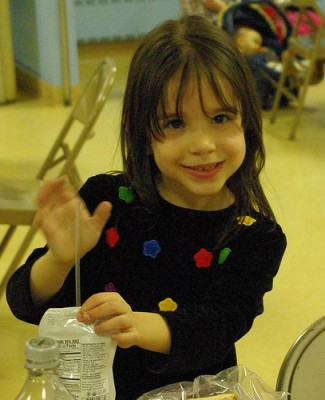When I was in kindergarten, back in the 1960s, we learned how to get along with others, we learned to follow the rules, we finger painted, we cut and pasted, and we had books read to us. Academically we learned our ABCs and 123s. I remember learning to stand in line, and learning that city kids were different than country kids, that "your neighbor" didn't literally mean the person you lived next to, and that the girl with the poofy hair could be nice as long as I didn't try to talk to her first thing in the morning. I also remember the importance of fitting in. One of my worst childhood memories was of a picture I did on the under paper (a paper put down under drawing paper to protect the table) instead of the regular paper. I also had the misfortune of drawing on this 8 1/2 x 11 inch piece of paper in the portrait view instead of landscape like anyone else. My teacher yelled at me, and on parent's night I was so ashamed of my ugly drawing! Lesson learned.
When Calvin was ready for kindergarten, I dutifully took him down to the parish school for kindergarten readiness. I figured he wasn't wearing diapers, he could put on his coat and he could get his shoes on without help, so he was ready. "Not so!" was the judgement of the teacher at the time. Apparently they asked Calvin, "To dance you need..." They were looking for "music" or "a radio." Calvin said, "A girl." Probably because we had been watching the ballroom competitions on PBS. But it was the wrong answer.
He flubbed another one too. "To take a bath you need..." The appropriate answer being soap, water, towel. Calvin said, "privacy."
I loved Calvin's answers, and thought that as long as they could be seen as logical they should be accepted as correct. But they weren't. I was looking at homeschooling at that time and took this experience as my sign from God to keep heading in that direction!
Now days, the pressure is on for pre-schoolers and kindergartners to hit the academic track and hit it hard. But I can't help but wonder if it makes any difference. In my inner city neighborhood I know more than my share of dropouts or almost drop outs. My neighbor kid who is my second son's age, fondly refers to himself as a Junior/Senior (between junior but not quite a senior). I see him walking to school some days, about two hours late. At least he's going. Head Start and kindergarten didn't seem to help him much. Some of the other public school kids I know tell me how much they hate school. Some tell my kids they wish they were being homeschooled.
Maybe we shouldn't be so surprised. Kindergarten has changed a lot since I was in it!
Pressure? This is kindergarten, the happy land of building blocks and singalongs. But increasingly in schools across Massachusetts and the United States, little children are being asked to perform academic tasks, including test taking, that early childhood researchers agree are developmentally inappropriate, even potentially damaging. If children don’t meet certain requirements, they are deemed “not proficient.” Frequently, children are screened for “kindergarten readiness” even before school begins, and some are labeled inadequate before they walk through the door.
Then came the No Child Left Behind Act of 2002 which links federal funding for schools to performance on standardized tests beginning in the third grade. Its passage “put the nail in the coffin” for the old ways, says Ed Miller, coauthor of the Alliance for Childhood study. “Faced with serious sanctions, they weren’t going to say, ‘OK, let them play and do all the things they used to do,’ ” Miller says. “Instead, we have to put them in testing boot camp well before third grade.”
A few years ago I homeschooled my 6th child through kindergarten. I went from a very rigid structure with my firstborn guinea pig kid - to very loose schooling with my baby. What I have learned was that it didn't matter what curriculum I bought, how much money I spent or how much time we put in, a successful kindergarten really only required a few important elements.
1. Experiencing and living the faith of the parents and the family - seeing the adults and siblings practicing their faith.
2. Learning the letters of the ABC. If they can read great! (only one of mine could and that is Miss Rosie, the kid who is getting the least structure homeschool experience!) But it's enough that they know the letters and the sounds. Help them draw, paint, or color letters for experience.
3. An introduction to numbers, counting, sorting and the calendar.
4. Spending time in real life situations like cooking, laundry, grocery shopping, gardening, listening to their siblings' lessons.
5. Listening to all kinds of good music and good books.
6. Opportunities to use legos, art supplies, and other supplies.
That's really it although I could add computer skills and t.v. if parents feel comfortable with those and want to monitor them.
But the main thing is to get the child excited about learning and getting a sense of accomplishment with a dollop of discipline for good measure. If that can be accomplished during kindergarten, that's a successful year!
Copyright 2013 Elena LaVictoire
About the Author

Elena LaVictoire
Elena LaVictoire is a graduate of Baker College and a retired medical transcriptionist. She is married and homeschooled six children. Elena is a public speaker on the topics of marriage, homeschooling, and confirmation preparation. She was also a contributing author to The Catholic Mom’s Prayer Companion. Elena practices and performs with her flute and records with the Peace Together Choir. She blogs at MyDomesticChurch.com.



.png?width=1806&height=731&name=CatholicMom_hcfm_logo1_pos_871c_2728c%20(002).png)
Comments